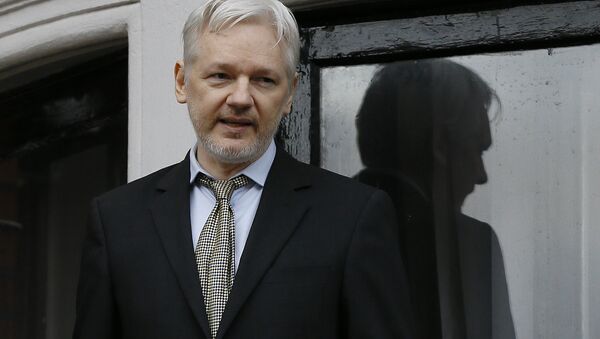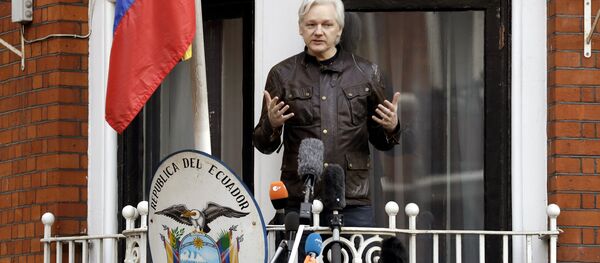Sputnik discussed the lawsuit with Peter Tatchell, Director of the Peter Tatchell Foundation, an independent Wikileaks commentator and human rights campaigner.
Sputnik: How high are the hopes of Mr Assange's winning the case against the Ecuadorian government?
Peter Tatchell: Well this is a very high-risk strategy because basically Julian Assange is staying safe in the Ecuadorian Embassy on the agreement and with the say-so of the Ecuadorian authorities. So for him to take legal action against them risks creating an extremely hostile relationship, which could, of course, provoke the Ecuadorian authorities to take further measures against him. Having said that, it is, of course, perfectly within Julian Assange's right to make this legal claim because he is an Ecuadorian citizen; he was granted citizenship, so he has all the rights that go with citizenship, including freedom of expression and freedom of association.
READ MORE: Ecuador Embassy Sets Rules for WikiLeaks' Assange Asylum — Reports
Now we know that in recent weeks there've been several requests for Assange to have a visit from his lawyers, which have been turned down by the Ecuadorian authorities. They've also blocked a visit by a representative from Human Rights Watch, who have turned around and described the circumstances under which Mr Assange is being held as equivalent to being held in solitary confinement and incommunicado. That's a very, very serious allegation, whatever you think about Julian Assange, he certainly, as an Ecuadorian citizen, has rights which are being violated by the Ecuadorian authorities in that Embassy.
Sputnik: Mr Assange's lawyer also said that they're challenging the legality of the Ecuadorian government's special protocol; where is this going to lead then from your point of view, what's your opinion about this?
Peter Tatchell: The special protocol does have very onerous conditions; journalists and lawyers and others that want to visit him have to hand over their codes and passwords to their mobile phones, their social media accounts and the Ecuadorian authorities reserve the right to share them with other third parties. In addition, anyone who visits Mr Assange in the Embassy does so under the condition that the Ecuadorian authorities have the right to seize their property and to hand it over to the British authorities. Now all these rules under these special protocols are arbitrary; Mr Assange has no right of appeal, there's no appeal process, so it's basically Ecuador laying down the law.
My hope is that the Ecuadorian court will rule in this forthcoming case that as an Ecuadorian citizen Mr Assange does have certain basic fundamental human rights and that these are being breached by the special protocol conditions that have been imposed upon him. Whether the Ecuadorian authorities will honor such a ruling by the courts, that's an open question.
READ MORE: Assange's Limited Wi-Fi Access Shouldn't be Mistaken as a Victory — Associate
Equally, of course, if he loses, if Assange loses then that will basically mean that these special protocols have a legal stamp on them and that they can be maintained presumably indefinitely, and it certainly looks like the purpose and intent of the Ecuadorian authorities is to make life as uncomfortable and as difficult as possible for Mr Assange so that he will eventually be so emotionally, psychologically and mentally stressed that he will voluntarily leave the Embassy.
Sputnik: What would you like to be seen done? You've covered this case in depth, what's the most sensible, pragmatic solution to this situation, what would you like to be seen to be done?
I think it would be very wrong for the British government not to give a guarantee of non-extradition, given that what Julian Assange did by publishing that information, information that was a link by Chelsea Manning and others, it was about shining a light, a spotlight on matters of genuine human rights concern. That to me is a public service, not a criminal matter, or should not be a criminal matter even though the US government wants it to be. I think the British government should simply turn around and say: "Look we will give a guarantee that Julian Assange won't be extradited to the United States and we will ensure that he has maybe a further two month prison sentence for skipping bail and then the matter would be closed."
The views and opinions expressed by the contributors do not necessarily reflect those of Sputnik.


